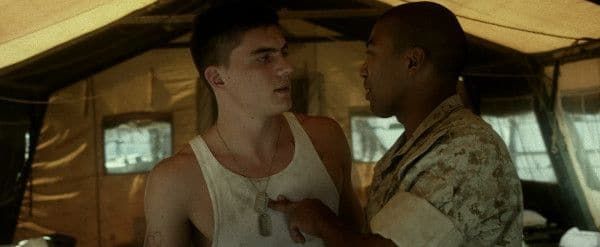Eye For Film >> Movies >> Battle Scars (2015) Film Review
Battle Scars
Reviewed by: Jennie Kermode

Post traumatic stress disorder used to be seen as a minor public health problem before the advent of new kinds of warfare. Today it is believed to affect around 20% of US soldiers returning home from conflict zones in the Middle East - around five times the rate in the general population. Therapy is slow and difficult, especially when symptoms are severe, and sometimes it's not effective at all. With services under-resourced, many former soldiers struggle to adjust to civilian life facing the additional burden of war terrors that just won't go away.
Luke (Zane Holtz) is such a man. After receiving his discharge, he seeks out his brother (Ryan Eggold), himself a former soldier, seeking not so much sympathy as the kind of understanding that might keep him out of trouble whilst he heals. But being around his brother means being around his father, veteran of a different type of war, whose attitude regarding what it takes to be a man is probably at the root of what got Luke out of his depth in the first place. Seeking solace in a local strip club, he meets Michelle (Heather McComb), who sees his defensive obnoxiousness for what it is and inadvertently becomes someone he can talk to. But Michelle has problems of her own. When her tough as nails boss Rifka (Fairuza Balk) accuses her of stealing, Luke's attempts to remedy the situation threaten to make it much, much worse.

Portraying a violent temperament with sympathy is always fraught with hazards. Though other aspects of his performance are rather flat, Holtz manages this well by making no effort to hide Luke's unpleasantness, letting us dislike him, but drawing us back with the fragility behind it. We are never invited to see him as cool, but rather as a man out of control, with the initially placatory brother gradually rising to take on a more traditionally heroic role as his protector and a man attempting to restore order. The cliché of the exotic dancer as damsel in distress is ameliorated somewhat by having a woman as the gangster who controls her, and Balk is riveting in the role, never allowing the viewer to doubt what she's capable of. Despite her fierceness, she also puts across relatable frustration at being messed around, a theme that runs through the film because of the less frequently explored ways that Luke's illness affects him, making him unreliable, chipping away at another cornerstone of socially approved masculinity.
This is a film with few surprises but the focus is less on plot than on character drama, and it's presented in a way that many veterans facing similar problems will find easy to relate to. With several films having been made on this theme, however, there's not much to make this one stand out. It feels like a personal project that was made without much reference to the wider cinematic context. A heavy handed soundtrack tells us what we should be feeling instead of letting the actors take us there. The result is a film weighed down by its own efforts to be meaningful. It's only when it picks up the pace that we see flashes of what director Danny Buday is really capable of.
Reviewed on: 11 Jul 2017














